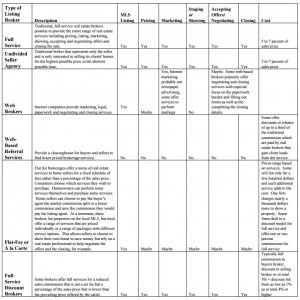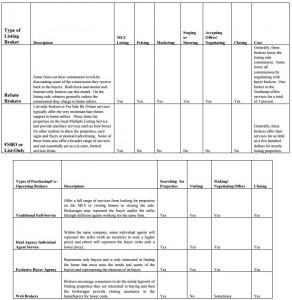Washington, D.C. – This morning the Consumer Federation of America (CFA) released a major study of nontraditional real estate brokers that shows how they have been growing despite pressure from traditional brokers, their trade association, multiple listing services, and even some regulators.
“Nontraditional brokers who charge lower prices or truly represent the interests of buyers or sellers offer these consumers more real choices in terms of commission rates, services, and representation,” said Stephen Brobeck, CFA’s Executive Director. “State regulators should join the U.S. Department of Justice and the Federal Trade Commission in working to stop blatant discrimination by traditional brokers against these innovative service providers,” he added.
The 18-page report, “Nontraditional Real Estate Brokers: Growth and Challenges,” was prepared by Patrick Woodall, CFA’s Senior Researcher, and by Brobeck. The study explains the different types of nontraditional brokers, their growth over the past decade, the ways many traditional brokers try to discriminate against them, and what regulators can do to prevent this discrimination.
Nontraditional Brokers Offer Widely Varied Prices and Services and Are Growing More Active
Nontraditional brokers offer widely varied services, prices, and types of representation. They include: Internet firms that take advantage of their internet presence to lower costs and prices; more traditional service providers who rebate, discount, or reduce commissions in some other way; and exclusive buyer and listing brokers who never act as dual agents. The two tables appended to this release describe the types and characteristics of nontraditional brokers working for sellers and buyers. Their only shared characteristic is that they try to offer consumers greater choice of services yet are opposed by many traditional brokers seeking to continue functioning as a cartel.
“In varying ways, nontraditional brokers threaten the high, fixed commissions and ‘double-dipping’ of traditional brokers,” said CFA’s Brobeck. “Those who lower or rebate commissions pose an obvious threat, yet even exclusive listing and selling brokers challenge the legitimacy of dual agency and its double commission dip,” he added.
There is significant evidence of the recent growth of nontraditional brokerage services. According to the consulting group RealTrends, from 2002 to 2005 the share of sales involving nontraditional brokers rose from two percent to eleven percent. In the same period, Help-U-Sell franchises grew from 200 to 800. And from 2001 to 2004, the membership of a new trade association representing some fee-for service brokers rose from 250 to 1,400. Publicly traded nontraditional firms such as RealEstate.com and ZipRealty have seen their business more than double in recent years.
One of the most reliable indicators of this growth is the expansion of Yellow Pages listings of nontraditional brokers. Between 1995 and 2005 in ten diverse cities studied, discount, flat-fee, and For Sale by Owner business directory listings increased by 152 percent. Moreover, in the same period the prominent, higher-priced display advertising by these innovative service providers increased by 31 percent while their use of boxed listings increased by 73 percent.
Many Traditional Brokers, Their Trade Associations, and Some Regulators Seek to Prevent or Limit Competition From Nontraditional Service Providers
Traditional brokers seek to limit access to multiple listing services by, and use state regulators as a weapon against, nontraditional brokers. They also try to make the lives of these nontraditional brokers difficult by refusing to cooperate with them and by disparaging their services.
“The ferocity of the traditional broker attack is stoked by a huge glut of agents who feel they can survive only by maintaining high, fixed commissions and the possibility of the doubledip,” said CFA’s Brobeck. “The math says that most of the two million licensed agents can participate in the sale of only a few of the seven million homes sold annually, thus severely limiting commission opportunities,” he added.
Discrimination against nontraditional brokers takes several forms.
Denying Full Participation in Multiple Listing Services: Some nontraditional brokers have had difficulty securing the membership in the local realtor trade association that is often required for access to the local MLS. Others face restrictions on the information they can supply consumers on their websites. Still others are denied the opportunity to have their listings sent to popular public interest Internet sites like realtor.com.
Boycotting Nontraditional Brokers: The report cites numerous instances of traditional brokers refusing to show the listings of a discount broker, even one that offers the full 3 percent commission split to cooperating brokers. It also cites an example of a buyer working with a nontraditional broker being denied the opportunity to purchase a condo.
Disadvantaging Nontraditional Brokers: Some traditional brokers have either delayed or reduced traditional commission splits to nontraditional brokers working with buyers. They have also pressured newspapers and magazines to not carry the advertising of nontraditional brokers.
Disparaging Nontraditional Brokers: As the report indicates, through advertising, publications, Internet blogs, realtor conferences and workshops, and direct communication with consumers, some traditional brokers have disparaged the services of nontraditional brokers, who are accused variously of unethical practices, incompetence, and even “whoring.”
Harassment by State Regulators: Traditional brokers use their huge influence over state regulators in most states to make life difficult for nontraditional brokers. They persuade them to support anti-rebate or minimum service laws, to pursue spurious or trivial complaints against innovative service providers, and even to disparage these providers in advertisements.
State Regulators Must Join DOJ and FTC in Fighting Blatant Discrimination Against Nontraditional Brokers
The single most important immediate measure that could be taken to prevent discrimination and promote competition is for state regulators to level the broker playing field by treating all brokers equally. These regulators should:
- intervene fairly in cases of anti-competitive actions against nontraditional brokers;
- prevent the use of frivolous actions by traditional brokerage to deter competition and poach clients;
- act in a timely and impartial manner in disputes; and
- study the state and local marketplace for bias against nontraditional real estate brokers and models.
State regulators also need to repeal or oppose anti-competitive laws or legislation such as minimum service and anti-rebate laws that exist in more than one-fifth of states. And they should direct state regulators to regulate the policies and practices of all service providers equally.
Consumers can also play a role in ensuring a more competitive, pro-consumer marketplace by shopping and negotiating for prices and services. They should also not hesitate to file a complaint with their state regulator when they see any evidence of discrimination against nontraditional services.



